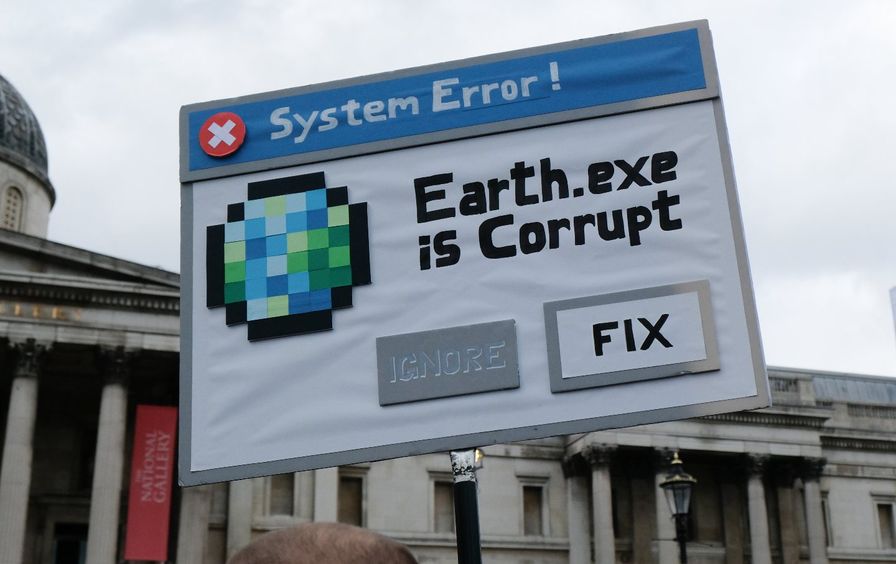Next week, thousands of people will gather from around the globe for the United Nations’ two-week COP26 climate conference in Glasgow, Scotland. The COP (Conference of Parties) was canceled last year, so this is the first such gathering since the COVID-19 crisis began, and the pressure is on global leaders to do something significant about climate change.
On the global scale, nations have been making new carbon-reduction pledges in the runup to COP26. A major breakthrough seemed to come in 2016 with ratification of the UN’s Paris Agreement, when all nations—including top emitters of greenhouse gases—committed to significantly reduce their carbon footprints by 2050. The pledges were voluntary, however, and most countries haven’t made much progress toward their goals. But now COVID and other natural and human-made disasters that have befallen us add to the realization that we face an existential threat—and many government leaders are responding.

They’re not moving as quickly as some climate activists would like, though. “Unless we do something, and fast, it’s going to bring a collapse of all of the earth’s systems,” says Peter Head, chairman of Resilience Brokers, a UK sustainability not-for-profit, and one of the founders of Pivot Projects, a global initiative that launched at the beginning of the COVID pandemic to help address the climate crisis. “I would tell world leaders that every child that’s born in your country from now on is going to face the collapse of human civilization, and you’ll never be forgiven unless you do something about it very urgently.”
Delegates to COP26 as well as heads of state from as many as 120 countries will gather in the sprawling Scottish Event Campus on the north bank of the River Clyde. Meanwhile, climate activists from the UK and around the world will be staging their own “fringe” events across the city. One of them, After the Pandemic @ COP26, is a combined street fair, education center, and design charette aimed at helping Glasgow and other cities and towns transform themselves in response to climate change.
While policy changes and investments on the national and global levels are critical to addressing climate change, civil-society groups realize they can’t depend on the UN or national governments to save the planet. They have to act now to reduce their communities’ carbon footprints and to adapt to the changes that are coming. After the Pandemic @ COP26, for example, was developed by local Glasgow organizations including After the Pandemic, a grassroots group that was formed at the onset of COVID to help the city become more sustainable and resilient. Graham Hogg, a director of the design firm Lateral North and one of the founders of After the Pandemic, says After the Pandemic @ COP26 “is a space where people can come in and engage with others at the local level. It’s about making sure COP is community focused and people focused.”

Since COVID, there has been an explosion of such groups aimed at helping to make the planet and communities more sustainable and resilient. “The role of non-state actors, including community-based projects and grass-roots movements, is more important than ever,” says Alex Joss, the lead for technology and innovation with the UN High Level Climate Champions team for COP26. He hailed the recent explosion of collaboration on digital platforms: “This makes community and grassroots projects scale even faster.” The Climate Champions have developed two programs, Race to Zero and Race to Resilience, which are aimed at elevating ambition and mobilizing climate action among communities, cities, regions, businesses, and investors.
(For an amazing example of a city where the government and private industry are aggressively pivoting away from reliance on fossil fuels and towards renewable energy, read about Aberdeen, Scotland, at Techonomy.com in an article to be published Wednesday, November 3.)
Some progressive businesses are also now leading the way, either individually or in partnership with other organizations. In September, more than 200 U.S. companies pledged to reduce their carbon emissions over the next two decades. One of the signers, Salesforce, went much further, announcing it has already become a net zero company—achieving 100% renewable energy across its operations and supply chain. The company also announced a cloud service to help its customers track and reduce their emissions. “I see a major change in the attitudes of businesses,” says Suzanne DiBianca, Salesforce’s chief impact officer. “Their employees are shouting about it. They see regulation coming. They see they have a role to play in social change. They have to serve all of their stakeholders, not just their shareholders.”
The US Coalition on Sustainability was inspired by a collaboration with UN Deputy Secretary-General Amina Mohammed to help unite businesses and other organizations committed to climate action and the UN’s Sustainable Development Goals. Its SustainChain platform, available from any connected device, provides an AI-based recommendation engine, search, and joint action space to inform action and help advance the SDGs. In a little more than one year, more than 1000 organizations have joined. (We’ll explain much more about SustainChain in an article that will be published on Techonomy.com Monday, Nov. 1.)
A number of related sustainability initiatives have emerged around the world since the onset of COVID that take a new approach, Pivot Projects and SustainChain among them. They share a set of core values, including a belief in the power of collective intelligence, systems thinking, and digital research and collaboration technology to help society and communities adapt and address environmental challenges.
Systems thinking is the idea that the world is a gigantic system of systems, both natural and human-made, where everything is connected, ultimately, to everything else. One of its key tenets is that when dealing with complex situations, it’s futile to try to break issues down into discrete problems to be solved in isolation from one another. We have to understand how they’re interrelated and then design interventions that address those factors.
Governmental leaders don’t tend to be big systems thinkers. In democracies, many of them focus primarily on getting reelected. Nor are CEOs oriented towards this approach. Many corporate leaders focus laser-like on quarterly earnings “We see a gross deficit of systems thinking at the level of senior decision making,” says Tim Lenton, a professor at the University of Exeter in the UK and director of the Global Systems Institute.
Still, Lenton is hopeful. His research into climate systems convinces him that there is great potential for what he calls “positive tipping points” to catalyze profound changes at a massive scale. He points as an example to the UK government’s imposition of a tax on carbon emissions in 2013 that led to a cascade of closings of dirty coal-fired power plants. “Positive tipping points can help accelerate or self-propel the change we need,” he says.
Lenton believes that positive tipping points can be launched at the hyper-local level as well. Examples are the transition town movement in the United Kingdom and the community garden movement in the United States. That’s one of the reasons he backed the creation of Exeter Living Lab, a partnership between Pivot Projects and the University of Exeter aimed at using systems modeling, collaboration, and AI-research tools to help students and faculty members connect with community groups in Exeter City for sustainability projects. (Exeter Living Lab will be the focus of an article at Techonomy.com on Friday, Nov. 5.)
Another core belief many of the new sustainability groups share is that society needs to make a major mind shift in how we operate day-to-day. Today, most government and business interactions with people are viewed as transactional. These sustainability groups believe we should treat our interactions as connection points in long-term relationships. Only if we recognize and deal with people as individuals—rather than generic customers, consumers, or clients, they have concluded, will we truly understand their needs, improve their lives, and make society work better.
This thinking has given rise to a new approach to managing organizations called “Human Learning Systems.” The initial focus has been on government services, and the idea is that the people who are being served by government agencies should be treated as part of complex webs of relationships; that the government agencies and non-profits that serve them should coordinate the services they provide with a focus on the needs of each particular individual; and that clusters of service organizations should experiment together and learn from their successes and mistakes. The same principles can be applied to organizations of all types and even to our personal interactions. “This scales from the individual level to local, national, and transnational,” says Toby Lowe, visiting professor of public management at the Centre for Public Impact, who was one of the initial developers of the Human Learning Systems approach.
(On Nov. 12 we’ll publish an article about a community-building program called Resonate Together in Alloa, Scotland that treats people respectfully and nurtures them via creativity.)
Pivot Projects shares these beliefs about the power of respect for the individual and connectedness. It was launched early in the COVID crisis as a global all-volunteer collaboration to help communities set out on more sustainable paths. It aims to size up climate-related challenges, using collective intelligence, systems mapping, and an AI-assisted research tool, SparkBeyond’s Research Studio. If you want to learn more about Pivot Projects or get involved, register for a free live and live-streamed event, It’s Time to Pivot, that the group is presenting on Nov. 6 in Glasgow as part of the Malin Group’s Spotlight series.
It has been a rough 19 months since COVID broke out globally. In addition to dealing with a pandemic, we face the complex threat of climate change even while political polarization and misinformation are clawing away at the pillars of civilization. But it’s not too late. There are things we can do as individuals and in small groups. And, in democracies, we can vote to save the planet. Let’s pivot now.
—
Steve Hamm is a freelance writer and documentary filmmaker based in New Haven, Connecticut, USA. He was embedded as a journalist in Pivot Projects and his book about the journey, The Pivot: Addressing Global Problems Through Local Action, has just been published by Columbia University Press. His dispatches from COP26 will be published by Technonomy.com over the next two weeks.
















